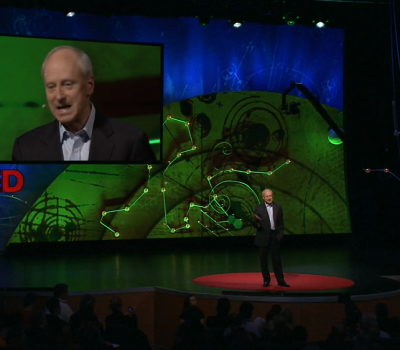ハーバード大学教授で企業倫理の第一人者のマイケル・サンデル(Michael Sandel)のTEDスピーチの英語を徹底解説する。日本語訳なしでも理解できるよう、単語と文法をわかりやすくご説明する。日本語訳ではわからない、マイケル・サンデルの本当のメッセージを感じて欲しい。
スピーチの題名は「Why we shouldn’t trust markets with our civic life」(なぜ市場に市民生活を託すべきではないのか)(2013年6月収録)だ。マイケルは、子どもの教育などを例に、市場経済が現代社会に及ぼしている影響について語っています。お子様をお持ちのビジネスパーソンの方におすすめだ。
なお、TED Talk でのオリジナルスピーチの画像は「Why we shouldn’t trust markets with our civic life」で楽しんでほしい。
なお、このスピーチはトータルで15分ある。全て一つのコラムにアップすると重くなるので3つのコラムに分けた。このコラムは2つ目だ。1つ目は「マイケル・サンデルの英語❶|市場社会の問題とは!TEDを解説」で楽しんで頂きたい。
I’d like to take an example of a controversial use of a market mechanism, a cash incentive, and see what you think about it. Many schools struggle with the challenge of motivating kids, especially kids from disadvantaged backgrounds, to study hard, to do well in school, to apply themselves. Some economists have proposed a market solution: Offer cash incentives to kids for getting good grades or high test scores or for reading books. They’ve tried this, actually. They’ve done some experiments in some major American cities. In New York, in Chicago, in Washington, D.C., they’ve tried this, offering 50 dollars for an A, 35 dollars for a B. In Dallas, Texas, they have a program that offers eight-year-olds two dollars for each book they read.
controversial /kɑ̀ntrəvə́ːrʃl/ (形) 議論を引き起こす
take an example of 〜: 〜の一例を挙げる
incentive /inséntiv/ (名) インセンティブ、動機付け ⇨ “cash incentive”「金銭的インセンティブ」
and (I’d like to) see 〜: 確かめる
what you think about it: “what” は先行詞を含む関係代名詞で「〜のこと」の意。 “it” は “cash incentive” を指す。
struggle /strʌ́gl/ (動) 取り組む、悪戦苦闘する ⇨ “struggle with 〜”「〜に取り組む」
disadvantaged /dìsədvǽntidʒd/ (形) 不利な条件に置かれた
motivating kids (, especially kids from disadvantaged backgrounds,) to study hard, to do well in school, (and) to apply themselves: “especially 〜 background” は挿入語なのでカッコに入れると理解しやすい。 “motivate kids to 〜”「〜するようkidsをmotivateする」の意。 “to” を並列で3つ並べているが、最後の “to” の前に、通常 “and” を入れる。
apply /əplái/ (動) ここでは「~に専念する」の意。 ⇨ “apply oneself”「専念する」
for getting good grades or (for getting) high test scores or for reading books: 重複を避けるためにカッコ内が省略されている。
offer /ɔ́(ː)fər/ (動) 提案する ⇨ ここでは “offer cash incentives 〜” と動詞の原形がいきなりきているが命令形ではない。 “which is to” を “offer” の前に加えて読むと理解しやすい。
experiment /ikspérəmənt/ (名) 実験
50 dollars for an A, 35 dollars for a B: “A” ”B” が学校の成績のこと。「Aをとったら50ドル、Bは35ドル」の意。
a program that offers eight-year-olds two dollars for each book they read: “that” は関係代名詞で先行詞は “a program”。 “offer (人) + (物) for 〜”「〜のために (人) に (物) を提供する」の意。 “eight-year-olds” は “eight-year-old kids” のこと。 “they” の前に関係代名詞 “that/which” (先行詞は “each book”)が省略されている。全体の意味は「8歳児たちに、一冊の本を読むごとに2ドルをあげるプログラム」。
So let’s see what — Some people are in favor, some people are opposed to this cash incentive to motivate achievement. Let’s see what people here think about it. Imagine that you are the head of a major school system, and someone comes to you with this proposal. And let’s say it’s a foundation. They will provide the funds. You don’t have to take it out of your budget. How many would be in favor and how many would be opposed to giving it a try? Let’s see by a show of hands. First, how many think it might at least be worth a try to see if it would work? Raise your hand.
Let’s see what: 「どうなのかちょっと見てみましょう」のニュアンス。
in favor (of 〜): (〜に)賛成して ⇨ “favor” (名) 味方、 (動) ~を支持する
opposed to 〜: ~に反対して
achievement /ətʃíːvmənt/ (名) 成果
what people here think 〜: “what” は疑問代名詞。ここでは間接疑問なので、“what” の後は平叙文の語順。「ここの人たちが何を考えているか」の意。
school system: 学校組織
with this proposal: “with” はここでは「持って」のニュアンス。「プロポーザルを持って」の意。
let’s say ~: ~だと仮定して
foundation /faundéiʃən/ (名) 基金
take it out of your budget: “it” は “fund” を指す。 “take 〜 out of …” 「〜を…から取り出す」の意。 How many (people) would be in favor: カッコ内が省略されている。 “would” は推量を表し「もし本当にやるとしたら」のニュアンスを含む。「(もしやるとしたら)何人の人が賛成か。」の意。
give it a try: 試しにやってみる
by a show of hands: 挙手によって
how many (people) think (that) it might at least be worth a try to see if it would work?: カッコ内が省略されている。that節内は “it – to” 構文。 “at least”「少なくとも」をカッコに入れると理解しやすい。“worth a try” は「トライする価値がある」の意。 “if” はここでは「〜かどうか」の接続詞。2つ目の “it” は “cash incentive” のこと。“would” は推量を表す。 “work” はここでは「役に立つ」のニュアンス。全体では「何人の人が、少なくとも、これ(cash incentive)が役に立つのかどうかを試してみる価値があると思うか」の意。
And how many would be opposed? How many would — So the majority here are opposed, but a sizable minority are in favor. Let’s have a discussion. Let’s start with those of you who object, who would rule it out even before trying. What would be your reason? Who will get our discussion started? Yes?
how many (people) would be opposed: カッコ内が省略されている。「(もしやるとしたら)何人の人が反対か。」の意。
sizable /sáizəbl/ (形) かなり多い
start with 〜: 〜から始める
those of you who 〜: “those” (代名詞) 人々。“who” は関係代名詞で先行詞は “you”。「〜であるところのあなた達」の意。
object /əbdʒékt/ (動) 反対する
rule it out: “rule 〜 out”「〜を外に出すと決める」のニュアンスから「〜を排除する」の意。 “it” は “cash incentive” のこと。
get our discussion started: “get 〜 started”「〜を始める」の意。
Heike Moses: Hello everyone, I’m Heike, and I think it just kills the intrinsic motivation, so in the respect that children, if they would like to read, you just take this incentive away in just paying them, so it just changes behavior.
Michael Sandel: Takes the intrinsic incentive away. What is, or should be, the intrinsic motivation?
HM: Well, the intrinsic motivation should be to learn.
MS: To learn.
HM: To get to know the world. And then, if you stop paying them, what happens then? Then they stop reading?
it just kills 〜: “it” は “cash incentive” を示す。 “kill” はここでは「台無しにする」のニュアンス。
intrinsic /intrínsik/ (形) 本来備わっている、本質的な
in the respect that children: 話者のHeike は英語ネイティブスピーカーではないのでここは文法的にも意味的にも説明不能。
take this incentive away in just paying them: “take 〜 away”「〜を取り上げる」の意。「彼ら(子供ら)に(現金を)支払うことによって」という意味であれば “by paying them” が正しい。
What is, or should be, the intrinsic motivation?: “What is the intrinsic motivation? Or what should be the intrinsic motivation?” を省略している。
should be to learn: “should” は「~のはずだ」のニュアンス。「学ぶことのはずだ」の意。
get to know 〜: “get + to 不定詞”「〜するようになる」から「知るようになる」の意。
MS: Now, let’s see if there’s someone who favors, who thinks it’s worth trying this.
Elizabeth Loftus: I’m Elizabeth Loftus, and you said worth a try, so why not try it and do the experiment and measure things?
MS: And measure. And what would you measure? You’d measure how many –
EL: How many books they read and how many books they continued to read after you stopped paying them.
MS: Oh, after you stopped paying. All right, what about that?
HM: To be frank, I just think this is, not to offend anyone, a very American way.
let’s see if there’s someone who 〜: “if” は、ここでは “whether” と同じ意味の「〜かどうか」の意。“who” は関係代名詞で先行詞は “someone”。「〜な “someone” がいるかどうか見てみましょう」の意。
worth trying this: “this” は “cash incentive” を示す。
why not try it: “why not + 動詞の原形”「なぜ〜しないの?」の意。
and (why not) do the experiment and measure things?: カッコ内が省略されている。 “things” はここでは漠然と「ものごと」。
experiment /ikspérəmənt/ (名) 実験 ⇨ “do an experiment”「実験行う」
measure /méʒər/ (動) 評価する
You’d: = You would
How many books they read and how many books they continued to read after you stopped paying them: “What would you measure?” に対する答えなので、本来は 過去形ではなく “〜 they (would) read, 〜 they (would) continue 〜 you (would) stop 〜” が正しい。
what about that: “that” は、ELの提案のこと。「“that” はどうですか?」の意。
To be frank: 正直なところ
I just think (that) this is (, not to offend anyone,) a very American way: “that” が省略されている。 “this” はELの提案のこと。 “not to offend anyone” は挿入語なので、カッコに入れると理解しやすい。
offend /əfénd/ (動) 〜の気分を害する ⇨ “not to offend anyone”「誰の気分を害するつもりはないが」の意。
All right. What’s emerged from this discussion is the following question: Will the cash incentive drive out or corrupt or crowd out the higher motivation, the intrinsic lesson that we hope to convey, which is to learn to love to learn and to read for their own sakes? And people disagree about what the effect will be, but that seems to be the question, that somehow a market mechanism or a cash incentive teaches the wrong lesson, and if it does, what will become of these children later?
What’s emerged from this discussion: “What” は先行詞を含む関係代名詞で「〜のこと/もの」の意。「この議論から “emerge” したこと」の意。
emerge /imə́ːrdʒ/ (動) 浮かび上がる
drive out: (群動) 追い払う ⇨ “drive”「運ぶ」と “out”「外に」で「外に運ぶ」のニュアンス。
corrupt /kərʌ́pt/ (動) 堕落させる
crowd out: (群動) 締め出す ⇨ “crowd”「押し寄せる」と “out”「外に」で「押し寄せて外に出す」のニュアンス。
convey /kənvéi/ (動) 伝達する
the intrinsic lesson that we hope to convey, which is (to learn) to love to learn and[love]to read for their own sakes?: “the higher motivation” を説明している。カッコ内は無視して良い(言い直しているため)。また[]内が省略されている。 “that” は関係代名詞で先行詞は “lesson”「(the higher motivation をいうのは、)我々が伝えたい本質的な教え」。 “which” も関係代名詞で先行詞は “lesson”「彼ら自身のために学びたい、読みたいという本質的な教え」。全体では「(the higher motivation をいうのは、)我々が伝えたい本質的な教えです。それは何かというと、彼ら自身のために学びたい、読みたいということ」の意。
what the effect will be: “what” は疑問代名詞。ここでは間接疑問なので、“what” の後は平叙文の語順。「効果がどうなったか」の意。 ⇨ “people disagree about what the effect will be” ここでは「人々はその効果に疑問をもつ。」のニュアンス。
(that) somehow 〜: 冒頭の “that” は無視してよい。言い間違えだと思われる。 “somehow” はここでは「何らかの形で」のニュアンス。
the wrong lesson: ここでは “intrinsic lesson” とは違う “lesson” のこと。
if it does: “if” は条件説「もし〜ならば」を導く接続詞。仮定法ではない。 “it” は “a market mechanism or a cash incentive”、 “does” は “teaches the wrong lesson” を意味する。
become of 〜: 通例 “what” または “whatever” を主語として「〜はどうなるのか」の意。 ⇨ “what will become of 〜”「〜はどうなるのか」
I should tell you what’s happened with these experiments. The cash for good grades has had very mixed results, for the most part has not resulted in higher grades. The two dollars for each book did lead those kids to read more books. It also led them to read shorter books.
what’s happened with 〜: “what” は疑問代名詞。 “with” はここでは「〜について」の意。全体では「〜がどうなったか」の意。
The cash for good grades: 「良い成績(グレード)にはキャッシュを支払うこと」のニュアンス。
has had very mixed results: “has had” は結果を表す現在完了形。 “mixed results” は「入り交じった(mixed)結果」の意。
for the most part has not resulted in higher grades: “for” はここでは理由を示し「〜の理由で」の意。 “most part”「大部分」。 “result in 〜”「〔結果的に〕~に終わる」。全体では「大部分が、良い成績の結果にはならなかった理由で」の意。
The two dollars for each book: 「一冊の本を読むと2ドルをあげること」のニュアンス。
did lead those kids to 〜: 通常は過去形の “led” だが、強調するために “did lead” となっている。「それらの子どもが〜するように導いた。」
shorter books: 「短い本」から、日本語では「薄い本」の意。
But the real question is, what will become of these kids later? Will they have learned that reading is a chore, a form of piecework to be done for pay, that’s the worry, or may it lead them to read maybe for the wrong reason initially but then lead them to fall in love with reading for its own sake?
Will they have learned 〜: 結果もしくは完了を表す未来完了形 “will have learned” の疑問形で「彼ら(子どもたち)は〜を習うことになるのか?」の意。
chore /tʃɔ́ːr/ (名) 面倒な[つまらない]作業
piecework /píːswəːrk/ (名) 出来高払いの仕事
a form of piecework to be done for pay: この句全体で “a chore” を言い換えている。 “〜 to be done for pay”「お金のためにする〜」の意。
worry /wə́ːri/ (名) 気掛かり
initially /iníʃəli/ (副) 当初は
may it lead them to read (maybe) for the wrong reason initially: カッコ内は挿入語。無視してよい。「それ(it = cash incentive)は、当初は彼ら(them = kids)を、誤った理由で本を読むことへと導いたかもしれない?」の意。
fall in love with 〜: ~に心を奪われる
for its own sake: それ自体に、そのものに
つづきは「マイケル・サンデルの英語❸|市場社会の問題とは!TEDを解説」で楽しんで頂きたい。

『英語独学完全マニュアル』
独学で効率的に習得する科学的学習法の全て(全79ページ)
英語は独学が基本です。しかし、「自分の学習方法が正しいかどうか…」不安に思っていませんか?本書は、英語の学習方法についてお悩みの皆さまに、第二言語習得研究と脳科学(神経科学)研究の知見に基づいた真に効率的な英語学習法をご紹介する解説書です。
無料eBookの主な内容
- 単語・文法・発音の効率的な基礎力強化方法
- インプット(読む・聞く)能力向上のための英語脳作りトレーニング法
- アウトプット(話す・書く)能力向上のためのリハーサル・トレーニング法
- 学習計画の立て方と効率性を上げるための学習習慣
そろそろ本気で英語を習得したいとお考えの方におすすめです。また、「英会話スクールに通っているけど思うように上達しない…」「TOEICで高得点を取ったけど話せない…」などでお悩みの皆さまも是非ご一読ください。



